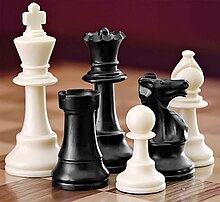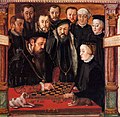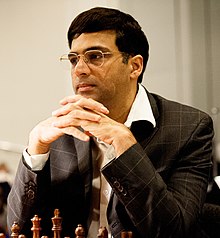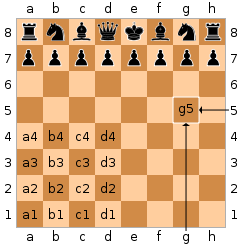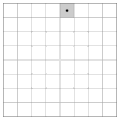
Back بوابة:شطرنج Arabic Портал:Шахмат Bulgarian প্রবেশদ্বার:দাবা Bengali/Bangla Portal:Šah BS دەروازە:شەتڕەنج CKB Portál:Šachy Czech Portal:Skak Danish Portal:Schach German Portal:Ajedrez Spanish Portail:Échecs French
Introduction
Chess is a board game for two players. It is sometimes called international chess or Western chess to distinguish it from related games such as xiangqi (Chinese chess) and shogi (Japanese chess).
Chess is an abstract strategy game that involves no hidden information and no elements of chance. It is played on a chessboard with 64 squares arranged in an 8×8 grid. The players, referred to generically as "White" and "Black", each control sixteen pieces: one king, one queen, two rooks, two bishops, two knights, and eight pawns. White moves first, followed by Black; then moves alternate. The object of the game is to checkmate (threaten with inescapable capture) the enemy king. There are also several ways a game can end in a draw.
The recorded history of chess goes back at least to the emergence of a similar game, chaturanga, in seventh-century India. After its introduction in Persia, it spread to the Arab world and then to Europe. The modern rules of chess emerged in Europe at the end of the 15th century, with standardization and universal acceptance by the end of the 19th century. Today, chess is one of the world's most popular games, with millions of players worldwide. (Full article...)
Selected article -
In mathematics, a queen's graph is an undirected graph that represents all legal moves of the queen—a chess piece—on a chessboard. In the graph, each vertex represents a square on a chessboard, and each edge is a legal move the queen can make, that is, a horizontal, vertical or diagonal move by any number of squares. If the chessboard has dimensions , then the induced graph is called the queen's graph.
Independent sets of the graphs correspond to placements of multiple queens where no two queens are attacking each other. They are studied in the eight queens puzzle, where eight non-attacking queens are placed on a standard chessboard. Dominating sets represent arrangements of queens where every square is attacked or occupied by a queen; five queens, but no fewer, can dominate the chessboard. (Full article...)
General images
Selected image
FIDE world ranking
| Rank | Player | Rating |
|---|---|---|
| 1 | 2831 | |
| 2 | 2803 | |
| 3 | 2802 | |
| 4 | 2801 | |
| 5 | 2777 | |
| 6 | 2768 | |
| 7 | 2763 | |
| 8 | 2754 | |
| 9 | 2751 | |
| 10 | 2750 | |
| 11 | 2747 | |
| 12 | 2747 | |
| 13 | 2741 | |
| 14 | 2741 | |
| 15 | 2740 | |
| 16 | 2739 | |
| 17 | 2734 | |
| 18 | 2734 | |
| 19 | 2733 | |
| 20 | 2733 |
Top 10 WikiProject Chess Popular articles of the month
Did you know...
- ... that Magnus Carlsen, the current World Chess Champion, resigned a recent tournament game after only one move?
Reviewed articles
Chess from A to Z
| Index: | A B C D E F G H I J K L M N O P Q R S T U V W X Y Z (0–9) |
| Glossary: | A B C D E F G H I J K L M N O P Q R S T U V W X Y Z |
Topics
Subcategories
Related portals
Related WikiProjects
Associated Wikimedia
The following Wikimedia Foundation sister projects provide more on this subject:
-
Commons
Free media repository -
Wikibooks
Free textbooks and manuals -
Wikidata
Free knowledge base -
Wikinews
Free-content news -
Wikiquote
Collection of quotations -
Wikisource
Free-content library -
Wikiversity
Free learning tools -
Wiktionary
Dictionary and thesaurus

